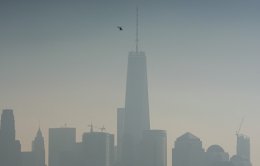Current Environmental
 [Sorry, the video for this story has expired, but you can still read the transcript below. ]
[Sorry, the video for this story has expired, but you can still read the transcript below. ]
HARI SREENIVASAN: More than 200 nations reaffirmed their commitment to the Paris climate accord today during a U.N. summit in Morocco. The show of support comes amidst worries that U.S. president-elect Donald Trump will pull out of the deal.
It also comes as dozens of wildfires continue to burn across the Southeast region of this country, more than 30 that are still uncontained in North Carolina, South Carolina, Georgia, Tennessee, Alabama, and Kentucky. And climate change could be one factor that may contribute to the drought conditions feeding them.
William Brangham has a closer look at how a Trump administration might change America’s course on climate change.
DONALD TRUMP (R), President-Elect: We’re going to cancel the Paris climate agreement.
Department of Environmental Protection, we’re going to get rid of it in almost every form.
WILLIAM BRANGHAM: Throughout the long campaign, Donald Trump made clear he wants a sharp turnabout in U.S. environmental policy.
DONALD TRUMP: Oh, coal country, what they have done.
WILLIAM BRANGHAM: He repeatedly pledged to undo the Obama administration’s Clean Power Plan, an aggressive effort to cut carbon emissions from power plants.
DONALD TRUMP: Energy is under siege by the Obama administration, under absolute siege. The EPA, Environmental Protection Agency, is killing these energy companies.
WILLIAM BRANGHAM: Since winning the election, the president-elect has tapped climate change skeptic Myron Ebell to head the EPA transition.
Trump has repeatedly expressed his own skepticism about climate change, like in this 2012 tweet, when he said: “The concept of global warming was created by and for the Chinese in order to make U.S. manufacturing noncompetitive.”
Two years later, he wrote: “Global warming is an expensive hoax.”
Meanwhile, the Paris climate accords officially took effect on November 4. They’re an agreement among dozens of nations all aimed at limiting worldwide warming to just an additional 2 degrees Celsius. That’s a little over 3.5 degrees Fahrenheit.
But doubts about what president-elect Trump will do are hanging over this week’s U.N. climate conference in Morocco.
MAN: We will not be silenced. The United States will shred the document.
WILLIAM BRANGHAM: It would take four years to withdraw from the Paris accords, but there are no enforcement mechanisms, so the new Trump administration could simply ignore the U.S.’ commitments.
In Morocco yesterday, Secretary of State John Kerry warned against taking that step. He said climate change shouldn’t be a partisan issue.
JOHN KERRY, Secretary of State: No one has a right to make decisions that affect billions of people based on solely ideology.
WILLIAM BRANGHAM: At the same time, 365 American companies have written to the president-elect imploring him to uphold the Paris accords and warning — quote — “Failure to build a low-carbon economy puts American prosperity at risk.”
So, what would environmental policy actually look like under a Trump administration?
David Roberts covers this for Vox. He is a writer and journalist who has long reported on the need for tackling climate change. He joins me now from Portland.
David Roberts, let’s start off talking about the man who’s going to help the Trump administration shape energy policy. Who is Myron Ebell and what does he believe?
DAVID ROBERTS, Vox: Myron Ebell is the director of the Climate Change Program at the Competitive Enterprise Institute, which is a think tank in Washington, D.C.
His belief is that climate change is a hoax or possibly no big deal, happening and no big deal, or possibly happening and good for us, depending on which day you ask him, so certain we don’t need any public policy to help counter it.
WILLIAM BRANGHAM: So, in some ways, he seems like an ideological fit as far as what we understand Donald Trump’s policies to believe and positions?
DAVID ROBERTS: That’s right.
I think it’s a very clear signal from the Trump camp that he wasn’t kidding in what he said about climate change on the trail.
WILLIAM BRANGHAM: Let’s talk a little bit about some of the things the Trump administration might do.
With regards to the Paris accords — this is, for those who are following along, a whole group of nations have binded together to say, we’re going to pledge to cut emissions going forward.




